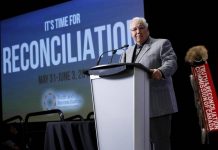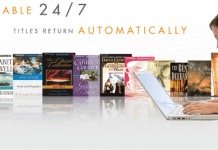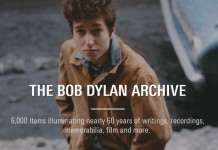 Maybe one person—excluding me—entirely read the Digital libraries vs. our national dumb-down: Could ‘civic dashboards’ and other innovations help America break out of an endless loop? That person, however, was Peter Levine, director of the Center for Civic Engagement and Community Engagement at Tufts University, who, besides supplying me with an essential citation, which I’ve happily incorporated in the Web version, said he liked my essay. “Your piece takes this general idea in important new directions that I hadn’t considered,” he said.
Maybe one person—excluding me—entirely read the Digital libraries vs. our national dumb-down: Could ‘civic dashboards’ and other innovations help America break out of an endless loop? That person, however, was Peter Levine, director of the Center for Civic Engagement and Community Engagement at Tufts University, who, besides supplying me with an essential citation, which I’ve happily incorporated in the Web version, said he liked my essay. “Your piece takes this general idea in important new directions that I hadn’t considered,” he said.
 Now here’s more fodder for my belief that the American public is pathetically ignorant of facts relevant to the civic debates, and that interactive national and local digital library systems could play a nonpartisan, non-ideological role in correcting this. Daniel B. Klein, a libertarian professor of economics at George Mason University, asked liberals and Democrats to respond to questions on basic economics. His Wall Street Journal article said he found plenty of misconceptions, such as the false belief that a company with the largest market share is a monopoly. Exactly! Ignorance knows no ideological or partisan bounds. In fact, at the urging of liberals, Klein went on to a second study showing, for example, that conservatives falsely thought that laws to control guns didn’t reduce access to them. His conclusion in his article for TheAtlantic.com? Americans of all ideological stripes are ignorant of inconvenient facts that challenge their positions. Isn’t it just possible, as I see it, that by making people more aware of the complexities in public debates, interactive digital public libraries could reduce polarization?
Now here’s more fodder for my belief that the American public is pathetically ignorant of facts relevant to the civic debates, and that interactive national and local digital library systems could play a nonpartisan, non-ideological role in correcting this. Daniel B. Klein, a libertarian professor of economics at George Mason University, asked liberals and Democrats to respond to questions on basic economics. His Wall Street Journal article said he found plenty of misconceptions, such as the false belief that a company with the largest market share is a monopoly. Exactly! Ignorance knows no ideological or partisan bounds. In fact, at the urging of liberals, Klein went on to a second study showing, for example, that conservatives falsely thought that laws to control guns didn’t reduce access to them. His conclusion in his article for TheAtlantic.com? Americans of all ideological stripes are ignorant of inconvenient facts that challenge their positions. Isn’t it just possible, as I see it, that by making people more aware of the complexities in public debates, interactive digital public libraries could reduce polarization?
Also of interest, Prof. Klein wrote that “Education had very little impact on responses, we found; survey respondents who’d gone to college did only slightly less badly than those who hadn’t. Among members of less-educated groups, brighter people tend to respond more frequently to online surveys, so it’s likely that our sample of non-college-educated respondents is more enlightened than the larger group they represent. Still, the fact that a college education showed almost no effect—at least for those inclined to take such a survey—strongly suggests that the classroom is no great corrective for myside bias. At least when it comes to public-policy issues, the corrective value of professional academic experience might be doubted as well.
Might interactive digital libraries, then, be a remedy—taking advantage of Americans’ ongoing encounters with library systems? And with new-media interactivity to strengthen their engagement?
I don’t know whether Klein would be open to the idea of a national digital library system (blended in well with local schools and public and academic libraries) as one response to the problems about which he has written. Given his libertarianism, he might oppose the idea. Then again, perhaps not. How can the free market be efficient, how can Adam Smith‘s invisible hand operate, if people lack access to information, whether about stocks, refrigerators, or public policy options? For all I know, this might even have been in the back of William F. Buckley Jr.’s mind when he supported my digital library vision back in the 1990s.
No, as I’ve written, I don’t see public libraries as replacing the news media as information sources. The biggest problem for public affairs journalists is that most people don’t care about their work. Online and in traditional ways, public libraries could help citizens become more engaged and better informed if librarians and others served as intelligent moderators and in a nonideological way kept the facts in the foreground and pointed people to the relevant resources within library systems. Read the just-mentioned citation from Prof. Levine’s work, in addition to my own essay, and you’ll see the possibilities. Hello, Digital Public Library of America? Interested?
Related: Klein’s GM Web page and an On the Media interview with him.
(Via LibraryCity.)


































Although I enthusiastically support the idea of national/local digital libraries, I don’t think that they will single-handedly address the problem of selective perception in politics, economics or any other area of human knowledge. Decades of research tell us that people generally read for confirmation. They do not voluntarily seek out cognitive dissonance despite the fact you established so well here that we sorely need it.
The instigation of cognitive dissonance is usually at the hands of good teachers and community leaders. They shame us for being too insular and provide us with alternative ways of looking at our world. This leads to discomfort and enlightenment.
So, yes, lets have national and local digital libraries that house ideas that will upset us. But let us also have people who will challenge us to use those facilities. Otherwise, these dissonant ideas will simply lie fallow.
Thanks for your thoughts, Frank. No, I am not proposing that libraries “single-handedly” do the job; among other things I specifically said libraries should work with schools. And my earlier piece even mentioned involvement of civics teachers and their students. What better way to help open up minds to dissonant ideas in the long term? Go to http://librarycity.org/?p=2173. I covered many aspects of the civic dashboard concept there, but here is a highly relevant excerpt:
“Civic dashboards could be part of the curricula of K-12 schools and ideally follow a standard visual format, so that no matter where students ended up, they could rely on local libraries for well-organized news of direct interest to them but neglected by the media. Perhaps local educators and students, members of neighborhood groups, and other volunteers could assist librarians in the preparation of the dashboards, complete with clearly labeled opinion sections, with wiki technology available for collaboration. Experience with local issues is one of the best ways of understanding national ones. The focus would be on truth-seeking as opposed to the media’s ‘cult of savviness,’ its fawning focus on politicians’ ability to kowtow to ignorant voters (a priority that Rosen so correctly decries).”
While schools are not succeeding fully in inculcating open-mindedness, I am hardly saying we should given up on their potential to do so with help from the library world.
Thanks,
David Rothman
LibraryCity.org
P.S. The word “the” should not be in front of the title of the earlier essay. I fixed that in the LibraryCity version of the current post. DR